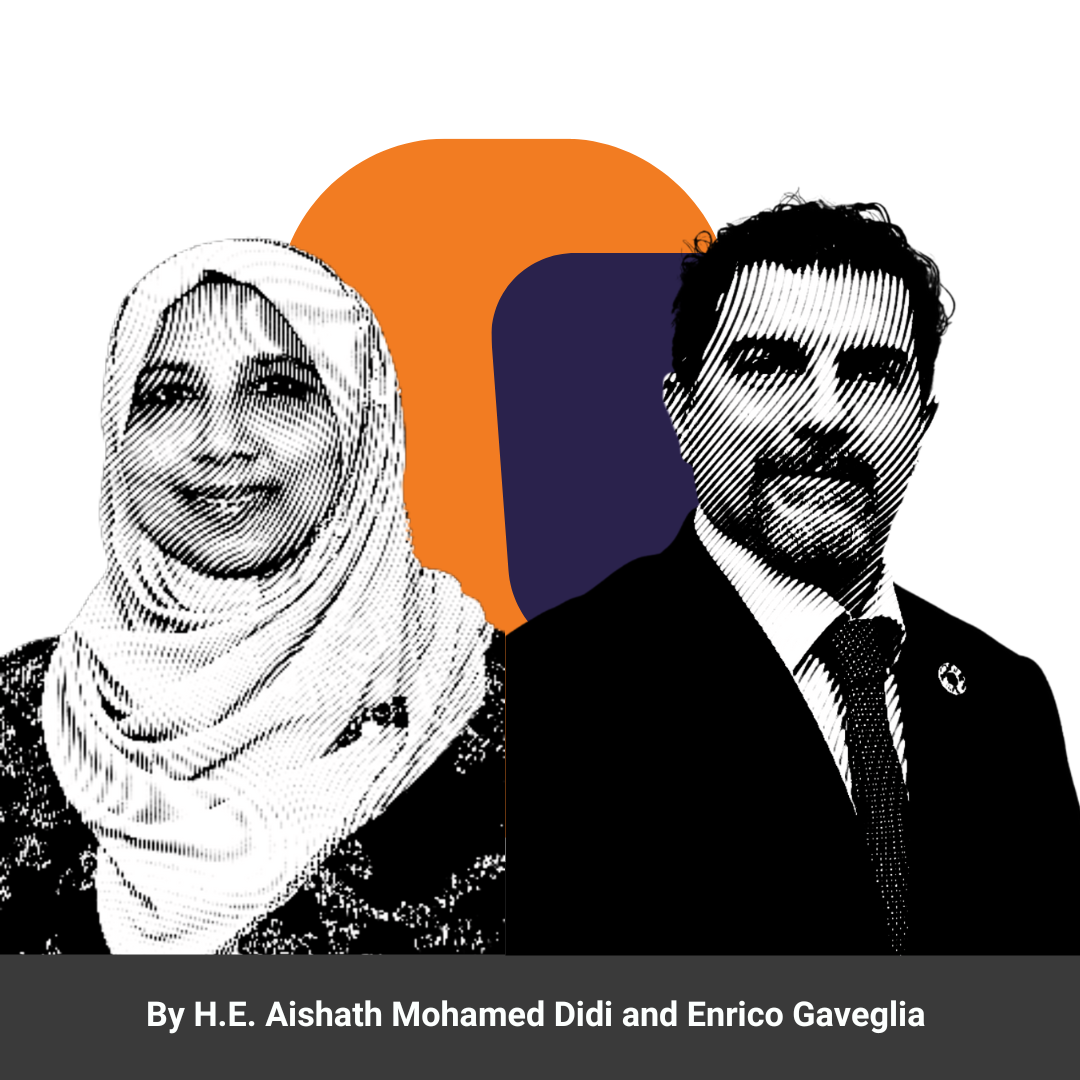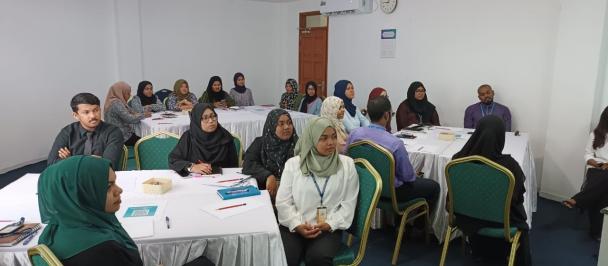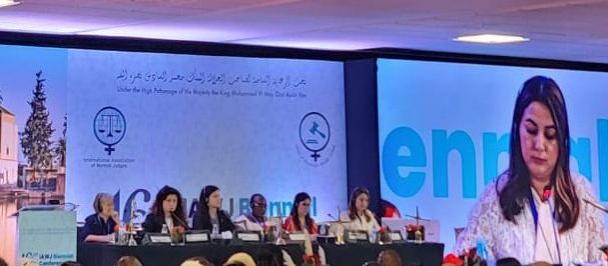By Aishath Mohamed Didi, Minister of Gender, Family and Social Services, and Enrico Gaveglia, UNDP Resident Representative in the Maldives
OP-ED: The Human Right of Safety
December 9, 2022

16 Days of Activism against Gender-Based Violence - 25 November to 10 December 2022.
*Trigger Warning: Mentions of harassment, abuse and violence
Unsafe Spaces
In a room filled with 22 women and 5 men, a question was asked. ‘How many of you have faced sexual harassment at some point in your life?.’ 22 hands went up - all the women. In the ensuing discussions, a recurring theme was the women’s harrowing accounts of having faced sexual harassment in public spaces: in the streets, in buses, cafes, in the workplace, on campus…
These were extremely difficult stories. The data on it is equally distressing. 96% of Maldivian women have faced street harassment at some point in their lives, with 60% first facing harassment before the age of 14, and 40% before they turn 10, according to a survey on public harassment carried out by a civic movement[1].
Wait, This Isn’t Normal?
“Cat calls and unwanted approaches by older men when I was still underage were nothing out of the ordinary. I normally ignore and keep silent when men whistle, repeatedly ask for my phone number, yell indecent things as I walk by, or even grope me.”
Sexual harassment is an issue that overwhelmingly targets women, and stems from their unequal stand ingrained in society. In dominant patriarchal cultures a sense of power and entitlement is assigned to men, and a sense of fear and tolerance of misbehaviour silences women - normalising their sexual harassment in public spaces.
The extent of normalization of sexual harassment can be evidenced by the low reporting of such incidents – as of September 2022, in Maldives 378 cases of gender-based violence (89% female, 11% male) have been reported to the Ministry of Gender, Family and Social Services (MoGFSS), and in 2021, out of the over 494 cases (87% women, 13% men) reported, 19 cases of sexual harassment in 2021 reported to MoGFSS (18 women, 1 man) were on sexual harassment.
Importantly, many of these behaviours are not classified as crimes in numerous national penal codes, or where they are, accountability is often lacking while this happens just about everywhere in the world. This points to the normalization of such behaviour - an offshoot of a legal and cultural atmosphere where they are seen as ‘normal’ parts of people with certain characteristics being in public spaces. This is not a ‘normal’ women, or anyone, has to endure.
How Bad Is It?
“Being constantly vigilant when you’re meant to be having a pleasant time or when you’re just trying to get home after school or work is just exhausting!”
That women and girls must keep themselves safe has become so deep-rooted in our socio-cultural psyche, it has become the norm for them to take actions to keep themselves safe. Their mobility is dictated by concerns for their safety and well-being.
Sexual harassment makes girls and women more fearful and less confident. It negatively affects their daily lives, sustains gender inequalities, violates the human right of safety, and damages individual and collective well-being.
Ending sexual harassment is also about economic justice. In Maldives, the labour force participation rate among females is 45.6% and among males is 77.1% for 2021[2]. If public spaces are not made fully accessible to women and girls, we will not be able to bridge the labour force gender gap. It can hinder women’s ongoing struggle to reach positions of greater social, political, and economic opportunity, or even reach their full potential if they get there.
Women and girls must feel safe everywhere.
Breaking the Silence
In 2022, the percentage of Maldivian women aged 15-49 who have ever experienced any form of sexual violence stands at 10.8%[3]. The third “Rights” Side of Life Survey[4] found that even though both men and women are subjected to sexual harassment in public spaces, the percentage of women who have experienced it is higher.
Sexual harassment is a continuum of gender-based violence and inequality - a pervasive form of violence against women.
A new era of sexual harassment reforms is much needed and is positively taking shape. To bring some to the fore:
In March 2022, the Government launched the National Gender Equality Action Plan (GEAP)[5], which prioritizes addressing Gender Based Violence and Sexual Harassment as key targets under its policy goals.
MoGFSS is undertaking the ‘Geveshi Gulhun’ campaign to transform social norms and promote positive messaging around healthy family and social dynamics. This is an instrumental step in addressing the root causes of gender-based violence (GBV).
Family Legal Clinic supported by UNDP, has been working to increase provision of pro bono legal assistance to cases of domestic violence disputes and sexual harassment at the workplace, as well as running awareness and advocacy campaigns on legal rights and rights to legal aid around sexual harassment.
Trainings have been conducted around domestic violence and sexual offences for the Judiciary in a bid to increase women’s access to justice.
These are progressive steps, but we must persistently ask, ‘is this enough?’
Why It Is Not Enough
That social protection systems are overburdened and underfunded the world over, is a fact. The average social worker in the Maldives has to oversee 76 cases centred around violence, abuse and harassment. The basic salary of a Social Protection Officer is MVR5,610 (US$363.20)[6]. Most of the caseworkers are based in Malé which means that survivors of gender-based violence and sexual harassment outside of the capital will face added difficulties in accessing justice or essential services. The current administration is making important strides to increase the funding and capacity of the social service workforce, and to diversify its services.
In the Maldives we have four different laws that covers offenses of violence against women, yet there remain challenges in implementing existing laws, with dearth’s in protection of evidence, and rights of the victim in accessing social services, and in investigation, prosecution, and trial stages[7]. Strengthened legal remedies and amendments to laws are certainly required. Some are stepping in: Family Protection Authority’s efforts to address offenses of violence against women includes rehabilitation of perpetrators of domestic violence and its efforts to address victims’ rights to access social services includes providing psychological assistance through their clinics. This is a march in the right direction.
Time’s Up!
The time to take the safety of women and girls seriously is ages past. Yet, we mustn't give up on the fight. We can't.
Addressing sexual harassment is a role to be played by everyone, and a responsibility of all State Institutes as well as private institutions. We need to allocate resources to fully fund the safety of women and girls. Political will and public policy must match the promises and commitments made. Women, as much as men, must have a seat at the table to ensure a comprehensive approach towards creating safer spaces for all women and girls.
We must shift towards creating systems of transformative and restorative justice to dismantle the culture of acceptance and normalization of abuse and violence against women and girls - where fully functioning legal dispositions for sexual harassment in public spaces are in place, and women have legitimacy to report and get justice for sexual and other forms of harassment and violence against them.
The culture of impunity and tolerance must end, so that survivors are heard, and accounts of abuse and harassment are taken seriously and attended to immediately, and perpetrators are held accountable and brought to justice.
We must decentralize and better distribute social protection capabilities to ensure that everyone, no matter where they are, is able to access essential care and support services. This has been a top priority of MoGFSS. The Ministry is investing in Family and Children’s Services Centres at the atoll level, and development of Domestic Violence shelters and ‘Amaan Hiyaas’ in the atolls, among other initiatives. Moreover, A multi-sectoral support mechanism formed at community level in all inhabited islands, by MoGFSS with support from UNICEF, ‘IBAMA’, is one such initiative actively working to prevent and respond to violence against women, children and other vulnerable groups.
We need to put in place a comprehensive age-appropriate and evidence-informed education curriculum which would lay the foundation for challenging social norms that normalize and perpetuate violence against women and children.
Lasting change comes from collective ownership of the need to change culture and attitudes and to establish common values, including the need for bystanders to intervene and take action.
Every one of us must be resolute in a ‘zero-tolerance’ approach to gendered sexual harassment in public spaces, and all other forms of oppression that hinder women’s ability to thrive.
Women don't have to be scared. They don't even need to be fearless. They just need to be given access to a safe and public space to be themselves: the right to respect and safety. Even with clipped wings, women hold up the world. Imagine what they can do when they are able to rise and soar.
###
[1] See Nufoshey’[1] (Don’t Harass) survey carried out in 2015(https://maldives.unfpa.org/en/news/maldivian-women-say-metoo?fbclid=IwAR3PkrVk7Z-Nv1Hj3i905yS9QVa3C5wgbuQIBXnQX7ziwR_ivzNf9q7UHWw).
[2] Available from Maldives Bureau of Statistics, Household Income and Expenditure Survey, 2019, Employment https://statisticsmaldives.gov.mv/nbs/wp-content/uploads/2022/04/Employment-Summary.pdf).
[3] Available from Gender Data Portal, World Bank 2022(https://genderdata.worldbank.org/countries/maldives).
[4] Available from The Rights Side of Life 2020 Survey supported by Human Rights Commission of the Maldives, Family Protection Authority and UNDP Maldives (https://hrcm.org.mv/storage/uploads/kKYy9YRy/2020RSL3Report.pdf).
[5] GEAP supported by Ministry of Gender, Family and Social Services and UNDP Maldives sets out realistic strategic goals that will help achieve key milestones in national priority areas on gender equality, as well as fulfilling international commitments towards gender equality, including achieving the targets of the Sustainable Development Goals (SDGs) and the recommendations from the Convention on the Elimination of all forms of Discrimination against Women (CEDAW) and Universal Periodic Review (UPR). See GEAP from MoGFSS website (http://gender.gov.mv/en/wp-content/uploads/sites/1/2022/03/GEAPFinal.pdf).
[6] Statistics from the audit of the Family Support and Social Services Department of the Ministry of Gender, Family and Social Services conducted in 2020.
[7] Statistics from the audit of the Family Support and Social Services Department of the Ministry of Gender, Family and Social Services conducted in 2020.

 Locations
Locations

